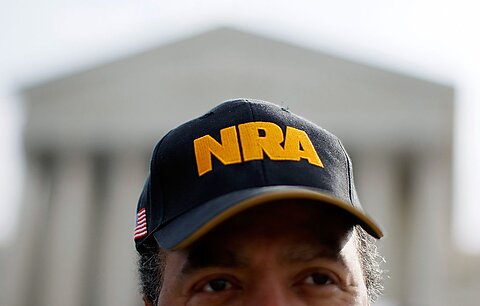
Walter Olson
Free‐expression advocates won a big victory at the Supreme Court in yesterday’s National Rifle Association v. Vullo, with Justice Sonia Sotomayor writing for a unanimous court with Justices Neil Gorsuch and Ketanji Brown Jackson concurring.
Brent Skorup, legal fellow in the Cato Institute’s Robert A. Levy Center for Constitutional Studies, responded with this statement:
The Supreme Court has been clear that a government official cannot directly or indirectly coerce a private party to punish disfavored speech on the government’s behalf. Today the Court unanimously reaffirmed that principle.
Acting on a tip from gun‐control advocacy groups, in 2017 New York’s Department of Financial Services began investigating insurance companies who offered insurance products to NRA members. New York regulators and Governor Cuomo, via meetings with and emails, statements, and guidance to those insurers, signaled that the regulators would focus their enforcement and investigations on insurers who continued to provide insurance products to the NRA and similar “gun promotion organizations.” Insurers discontinued services to NRA members and the NRA sued for violation of the organization’s First Amendment rights.
The Supreme Court today reversed the Second Circuit Court of Appeals and held that the NRA plausibly alleged violation of the organization’s free speech rights. New York regulators’ actions were not “examples of permissible government speech” and were not “legitimate enforcement action.” The Court held that the NRA’s allegations, if true, were coercive threats aimed at punishing the NRA’s speech in violation of the First Amendment. The case is remanded for further proceedings. The Court reached the correct result and it’s encouraging to see a unanimous affirmation of an important precedent that the government cannot use its power to indirectly chill the speech of private parties and government critics.
Writing with David Rifkin in the Wall Street Journal in 2022, Cato adjunct scholar Andrew Grossman said that in its earlier decision upholding New York’s actions, the Second US Circuit Court of Appeals had “provided a road map for officials to circumvent the First Amendment’s protection for freedom of speech.” It was that Second Circuit ruling that the high court vacated and remanded yesterday,
In January, Andrew Grossman and I did a Cato Podcast with Caleb Brown previewing the case. On the podcast, The Reload, Cato adjunct scholar Robert Corn‐Revere examined the stance of the US Justice Department, which weighed in on behalf of a somewhat narrower interpretation of First Amendment protection.
“The amusing part,” I wrote in 2020, “is that the public officials themselves are helping to provide the basis for these rulings by tweeting and speechifying about how much damage they intend to do the NRA.” I cited cases in California in which responsible officials had been even more candid than had been New York Gov. Andrew Cuomo about their motivations. And a Cato briefing paper last October by Andrew Grossman and Kristin Shapiro put the case into context of other efforts by government officials to jawbone or simply coerce private parties into constricting others’ speech.





